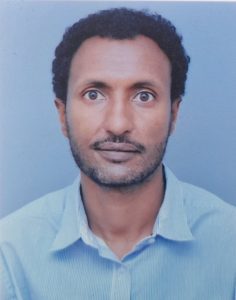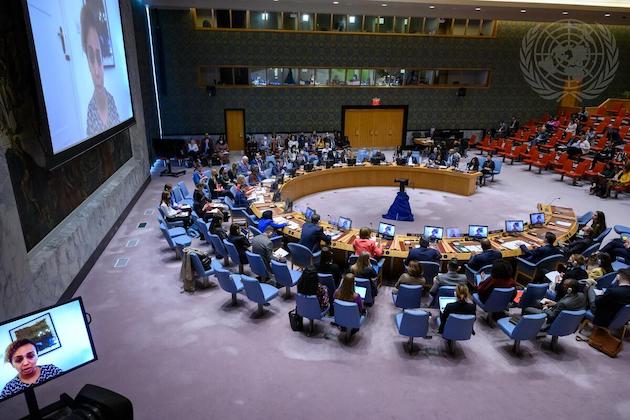ACCRA, Aug 22 (IPS) – The war in Tigray, northern Ethiopian, led to sexual and gender-based violence against women, but when Hilina Berhanu Degefa, researcher, gender policy expert and co-founder of the Yellow Movement AAU, appeared before the UN Security Council Open Debate on Sexual Violence in Conflict last year, and catalogued the problems that the victims of the war faced, it didn’t shock the world.
Giving a background, Degefa said, “When the war first started, Blen, a 21-year-old waitress from Badme, along with around 30 other Tigrayan women, was held against her will and subjected to sexual slavery, starvation, and gang rape by a group of Eritrean and Ethiopian soldiers who took turns with her.”
“I documented many other stories like Blen’s during multiple visits to the Tigray region before June 2021. Sexual violence was used to terrorize communities and build camaraderie amongst allied forces of the Eritrean Defence Forces, Ethiopian National Defence Force, Amhara regional militia, and special forces through the shared experience of exploiting women’s bodies.
“The consistency across victims’ accounts shows that these crimes were committed with a degree of organization, planning, and intent to dehumanize individuals and communities,” she said.
Now, a new study has confirmed that 99 percent of the survivors of sexual and gender-based violence during the conflict have not received medical or psychological care because most health facilities were destroyed and looted.

The authors have, therefore, suggested the establishment of an urgent survivor centre approach with medical and psychological services, together with sustained community support, to reduce the lifelong impact on the behavioural, emotional, sexual, social, and economic fortunes of the victims.
Published by BMJ Global Health journal, the study, “War-related sexual and gender-based violence in Tigray, Northern Ethiopia: a community-based study,” is a survey conducted in six zones of Tigray after the Eritrean, Ethiopian and Amhara forces left Mekelle, the capital of Tigray.
The western zone of Tigray and the districts bordering Eritrea were not included for security reasons. Women of reproductive age (i.e., 15–49 years) recruited from the study communities were included as primary respondents in this survey. Information on girls under 15 years and women above 50 years of age was also collected from the primary respondents, and the period of the SGBV incidents covered from 4 November 2020 to 28 June 2021.
Findings from this study indicate a higher incidence, nearly 10 percent more of rape, than those reported in other studies during conflicts, such as in Northern Uganda, 4.2 percent; Sierra Leone, 8 percent and Ukraine, 2.6 percent. In the case of physical violence, 28.6 percent observed in this study was higher than the findings for East Timor, Indonesia, where 22.7 percent of the women were physically assaulted.
Co-author of the study, Kiros Berhane, professor at the Cynthia and Robert Citron-Roslyn and Leslie Goldstein, and Chair, Department of Biostatistics Mailman School of Public Health, Columbia University in the U.S. told the IPS why they were motivated to conduct the study. “During the war period in Tigray, there were unprecedently high incidents of SGBV reported by various humanitarian agencies, local and international media, including gang-rape and other extreme types of abuses such as insertion of foreign objectives to the victims’ private parts.
“Most of the reports were coming from health facilities around big towns. Health professionals working at university hospitals (including many on the author list of this manuscript) observed many rape survivors admitted to Mekelle Hospital and Ayder Comprehensive Specialized Hospital (one-stop centre),” he said.
Berhane said the main objective of the study was to scientifically and thoroughly document the level and severity of war-related SGBV in Tigray beyond the sporadic and incomplete (but still shocking) reports in hopes that policies and actions could be activated to help rape survivors and further prevent the rape incidence in the community, adding that, “this study provides first-of-its-kind objectively/carefully collected primary data on scale/level of SGBV in Tigray.”
Degefa gave a chilling account of a Tigrayan woman who was fleeing the conflict zone with her children, and encountered the Amhara militia, who separated her from her family, gang-raped her and inserted a hot metal rod into her uterus and declared that a Tigrayan should never give birth.”
“Similar incidents of rape with claims of cleansing “Tigrayan blood” and mutilating women’s bodies to prevent the birth of more generations of Tigrayans have been extensively covered by different human rights reports,” she said.
Degefa said sexual violence was also used to humiliate survivors and their families and cited a case of an Amhara woman who was beaten and raped in the presence of her husband and child by two members of Tigrayan forces. Men and boys were also sexually assaulted, she said, adding that the Ethiopian Human Rights Commission found in Samre town, in Tigray, 600 men and boys who were stripped and forcibly paraded, some completely naked, while Eritrean female soldiers mocked them and took pictures.
She said women with disabilities and other vulnerable communities were also at particular risk during this conflict. “Many women with disabilities were specifically targeted in the Tigray region as they were presumed to be fighters in the previous war. Girls, older women, and women belonging to a minority or indigenous communities also faced higher risks, Degefa added.
The lack of access to the region for independent human rights monitoring means it has been tough to document the impact of the conflict in minority communities and especially those living in disputed areas on the Eritrean border, such as the Irob and Kunama in Tigray.
In her opinion, the conflict in Northern Ethiopia, and the effective siege of the Tigray region, in particular, has undermined women’s rights, including access to reproductive healthcare and psychosocial support, exacerbating the impacts of sexual violence.
Degefa said the lack of access to psychosocial support services means that the mental health of survivors of sexual violence hangs in the balance. Many have already died by suicide, adding that the story of a 50-year-old Amhara woman from Shewa-Robit in central Ethiopia, who was gang-raped by Tigrayan fighters in the presence of her son in the next room and later died of suicide.
Following their study, Berhane said he would expect the Ethiopian government and the international community “to provide immediate action such as supporting survivors, their children and provide the opportunity for medical, psychological and economic rehabilitation.”
In addition, there is a need for the supply of adequate medical supplies and medications to health facilities in the war zone. The government must also work with all partners and NGOs to try and trace survivors at the community level for further medical and psychological support.
IPS UN Bureau Report
Follow @IPSNewsUNBureau
Follow IPS News UN Bureau on Instagram
© Inter Press Service (2023) — All Rights ReservedOriginal source: Inter Press Service
Check out our Latest News and Follow us at Facebook
Original Source

